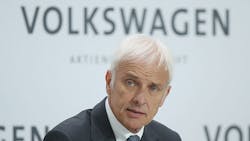Volkswagen AG CEO Matthias Mueller mapped out a sweeping strategy overhaul focused on electric cars, automated driving, and services such as ride-hailing in an effort to emerge from the cheating scandal that has weighed on the company for months.
The shift will entail more than 10 billion euros ($11.30 billion) in investments by 2025, which will be financed in part by cost-cutting at the namesake VW brand and bundling together its fragmented parts operations, the company said Thursday at a press briefing at its Autostadt exhibition center in Wolfsburg.
Playing a leading role in the automotive industry “will require us — following the serious setback as a result of the diesel issue — to learn from mistakes made,” Mueller said in his first major strategy presentation since taking charge after Volkswagen admitted last September to cheating on emissions tests. The new goals will make the company “more focused, efficient, innovative, customer-driven and sustainable.”
The crisis has forced Volkswagen to accelerate efforts to adapt to the industry’s shift toward self-driving electric cars. The emissions scandal has so far cost the company 16.2 billion euros ($18.30 billion) and highlighted the risks of its rigid structure and focus on expansion, which caused it to largely miss the trends that led to the emergence of the likes of Tesla Motors Inc. and ride-sharing service Uber Technologies Inc.
“In order to achieve its goals, VW will need to make its underlying business significantly more efficient,” Arndt Ellinghorst, a London-based analyst with Evercore ISI, said in a note. The shares fell 1.3% to 118.65 euros ($134.03) at 1:45 p.m. in Frankfurt.
To catch up with rivals, Volkswagen plans to introduce more than 30 electric cars by 2025. It forecast sales of as many as 3 million of its battery-powered vehicles annually by then, the equivalent of as much as 25% of its global sales.
Volkswagen also plans to establish a mobility-solutions business that will develop its own services and acquire companies in areas such as ride-hailing, robo-taxis and car-sharing. The goal is to generate billions of euros in revenue from the efforts by 2025, VW said. A $300 million investment last month in ride-hailing app Gett was Volkswagen’s first foothold in the burgeoning field.
To vie with Google’s efforts to develop self-driving vehicles, Volkswagen aims to create its own system for autonomous vehicles and license it to other companies by the end of the decade.
The new strategy could also include an expansion of Volkswagen’s truck operations into the U.S. The division, which owns the Europe-focused MAN and Scania brands but isn’t active in North America, is targeting a significant presence in “all key regions,” the company said.
Volkswagen plans to expand in these new areas while also seeking to rein in research and development spending. That calls for changes such as streamlining its component operations. The company is also negotiating with labor unions for as much as 8 billion euros ($9.04 billion) in productivity gains, especially at Volkswagen’s namesake brand, the 12-brand group’s largest unit, which was struggling even before the emissions cheating hit its image.
By the end of this year, Volkswagen will present detailed steps to implement the plan, including financial targets for its units. On the group level, Volkswagen expects to raise its operating return on sales to between 7% and 8% by 2025, up from 6% before special items last year.
The timing of the strategy statement is a signal that Volkswagen is past the worst of the cleanup. Still, the company will face shareholders on June 22 without a settlement in the U.S. — a federal judge pushed back the deadline late Wednesday for an agreement, originally set for June 21, by a week.
By Christoph Rauwald
About the Author
Bloomberg
Licensed content from Bloomberg, copyright 2016.
